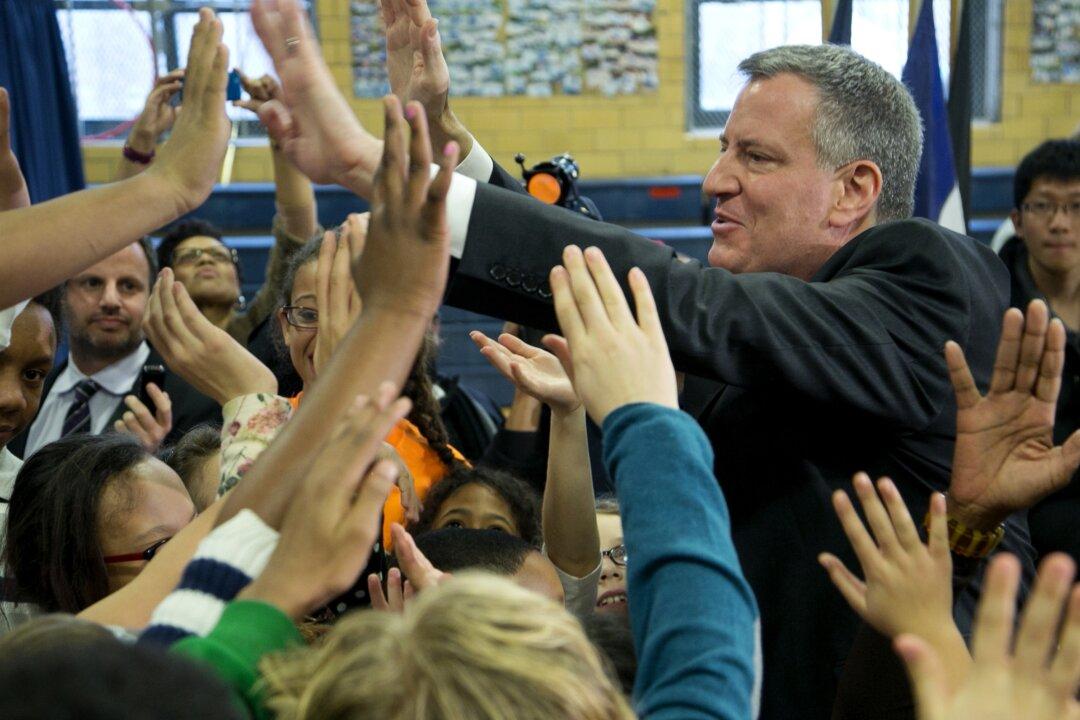NEW YORK—In a dramatic turnabout from the Bloomberg administration the city’s Department of Education withdrew nine approved plans for school co-locations Thursday.
Co-location is the practice of moving a school into a building where another school already operates. The Education Department approved 49 school co-locations shortly before Mayor Bill de Blasio was sworn into office. De Blasio promised to revisit the process and had the Education Department review all of the schools approved to co-locate in 2014.
Former Mayor Michael Bloomberg favored co-locations as a way to put unused school facilities to use while creating more school choices for parents and children.
But Bloomberg’s favoritism often went too far. The Panel for Educational Policy often unanimously approved co-locations even after vociferous protests from parents, students, school administrators, and politicians.
The schools department established a set of four criteria as it reviewed co-locations. First, elementary schools can no longer be co-located inside high-school buildings. Second, the department will no longer approve small schools with less than 250 students, since they have limited capacity to serve students. Third, co-locations that require extensive construction received increased scrutiny. And lastly, the department would not approve co-locations that reduce space for special education students.
“While the circumstances for each proposal are unique, we identified clear criteria and we followed it. But more importantly, as enrollment deadlines approach, we considered the thousands of families that could be affected,” Schools Chancellor Carmen Fariña said. “We were deliberate in our decisions and, under the circumstances we inherited, believe this is the best approach.”
Success Academies
Three of the nine schools that will no longer be opening this year as planned are charter schools, and all three are from the Success Academy network. The Education Department withdrew proposals for 3 out of 11 Success Academy co-locations.
The Success Academy network is run by Eva Moskowitz, a former city council member and a polarizing figure in the city’s education circles. De Blasio has previously outlined plans to charge charter schools rent and singled out Eva Moskowitz for her nearly $500,000 salary.
“There’s no way … Eva Moskowitz should get free rent [for her schools], okay?” de Blasio said during his campaign in June.
Charter schools are publicly funded, but can be privately operated. They do not currently pay rent for space in public school buildings.
In January, the Education Department diverted $210 million from the charter schools construction fund, underlining the new criteria of not committing to extensive construction for co-locations.
Criticism
Both the withdrawn proposals and the ones still on schedule to be implemented drew criticism. Council member Martin van Buren issued a statement saying that he was disappointed that the DOE “will pursue its rushed plan to force the co-location of another school at Martin Van Buren High School.”
“At the same time, I have received assurances from the chancellor’s office that going forward, the DOE will work in consultation with the local community to ensure that the programs at Martin Van Buren High School meet the community’s needs,” Weprin said.
There were voices of concern about some of the charter schools rolled back.
“To see these public schools effectively closed is heartbreaking. It contradicts everything Mayor de Blasio campaigned on when he called New York a tale of two cities,” said Ian Rowe, the CEO of Public Prep, a network of four charter schools.
More than 90 percent of the children attending charter schools are black and Latino, with three-quarters coming from low-income families.





